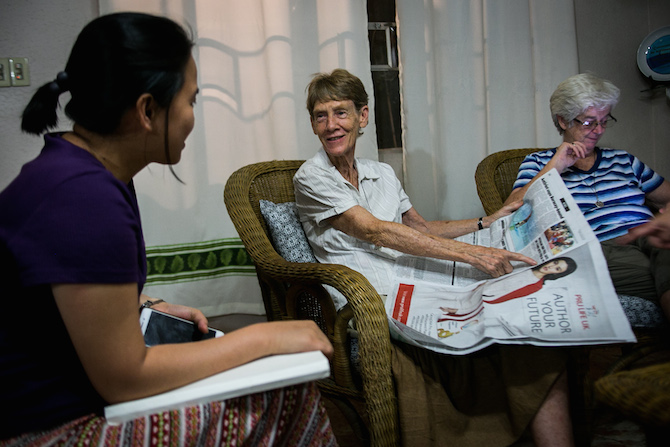
Sister Patricia Fox, Australian provincial superior of the Our Lady of Sion Sisters in the Philippines, tells of her ordeal at the hands of Philippine authorities early this week at the convent of the Our Lady of Sion Sisters in Manila. (Photo by Mark Saludes)
She has been described as frail, old, skinny and weak, but she made the tough-talking leader of the Philippines seethe in public.
"Who are you?" fumed President Rodrigo Duterte. "You do not have the right to criticize us.... Just because you are a nun?
The president even admitted that he personally ordered an investigation into the activities of Sister Patricia Anne Fox.
Who indeed is this 71-year-old Australian nun whose detention hogged the headlines in Manila?
Sister Pat, as her friends call her, and her Congregation of Religious Sisters of Our Lady of Sion have been working in the Philippines since 1990.
Marie Theodor Ratisbonne and his brother Marie-Alphonse Ratisbonne established the missionary congregation in France in 1843.
In 1890, the congregation established its presence in Australia with a mission "to improve Catholic-Jewish relations and to witness God's faithful love for the Jewish people."
Sister Pat practically grew up with the Sisters of Sion. Her basic and high school education were at institutions run by the congregation in Melbourne.
She wanted to be a teacher, but due to financial difficulties, the future nun worked in a bank for three years to let her siblings finish high school.
Sister Pat entered the congregation in 1969 after taking up teacher training for two years. After ten years, she took her final vows as a religious missionary.
Her exposure to urban poor communities in Melbourne, "where people have no financial capacity to get a lawyer," spurred her to study law in 1980.
After passing the bar exam in 1984, the nun was invited to the Philippines for a Filipino-Australian "solidarity exposure" to look into the economic situation in the country.

Australian nun Patricia Fox of the Our Lady of Sion Sisters, emerges from the Bureau of Immigration in Manila after her release from detention on April 17. (Photo by Mark Saludes)
"I fell in love with the Filipino people. I was inspired by their resilience and sense of humor, even in the middle of a crisis," she told ucanews.com.
She said her congregation needed "to see the world through the eyes of the poor" and they saw the widespread poverty in Asia.
The Australian province of Sister Pat's congregation was later given a mandate to look into establishing a presence in Asia.
"We looked into different countries, but I have a bit of bias towards the Philippines," she said.
In 1990, Sister Oonagh O'Shea and Sister Pat arrived in the country to start work. The late theologian and bishop of Infanta, Julio Xavier, Labayen adopted the sisters.
Missionary work started a year after the nuns arrived. Before getting involved in community work, they had to take up a language course in Davao City.
"Communication is an important tool in every dialogue, especially with culture," said Sister Fox in perfect Tagalog.
The nun then stayed for five years in Aurora province, south of Manila, to work with the justice and peace ministry of Infanta Prelature.
"They invited me because they knew I am a lawyer. We did a lot of research on mining and various land issues," said the nun.
The results of Sister Pat's research were used to educate farmers on their rights to land and the impact of destructive extraction on agriculture and the environment.
The nun later became coordinator of the Rural Missionaries of the Philippines where she was exposed to the bigger struggle for land reform.
Sister Mary Badic, superior-general of the Sisters of Sion congregation, said Sister Pat's involvement in human rights issues "is an obedient response to her missionary calling."
In a statement sent to ucanews.com, Sister Badic said Sister Pat's work as a missionary explains why she is seen among the poor.
Philippine immigration authorities used a picture of the nun visiting a detained farmer as evidence supposedly to prove her involvement in political activities.
"Following the mandate of the church mission of proclaiming the Good News to the poor, she has since given her life as a religious to the service of the poor and those in need on the peripheries of society," read the statement from the congregation's superior-general.
Despite her age, Sister Pat never thought of retiring from her work, although she is forcing herself to slow down. Her responsibilities as provincial superior of the congregation in the Philippines also obliges her to do office-based work.
"A church worker never retires," she said, "as long as there is air and you're breathing."

Sister Patricia Fox, Philippine provincial superior of the Our Lady of Sion Sisters, spends time with fellow nuns after her release from detention in Manila. (Photo by Mark Saludes)
In 2015, the nun joined the Union of Agricultural Workers as its spiritual director. She travelled to far-flung areas to listen to the stories of farmers.
She also administers the congregation's organic farming program that provides technical assistance to peasants.
The nun finds it "funny and a bit annoying" that she was accused of involving herself in politics when she visited farmers in Mindanao recently.
"I was there not to investigate something but to reach out to those who are imprisoned. What do you think a spiritual adviser does?" she said.
"The government should try to understand the nature of my work as a religious missionary. I talk to people regardless of their faith, political belief, or affiliation," Sister Pat told ucanews.com.
She complained that her detention at the immigration bureau this week attracted too much attention.
"I am not used to being in the spotlight. I am a silent worker. I don't want too much attention. I think I don't deserve this," she said.
"But I am not tired," she said, adding that the people who turned up to support her, especially the farmers, the priests and the sisters, keep her going.
When asked if she was scared, she said she was "scared of being deported or denied entry" back into the country. "If I will die, I should die in the Philippines," she declared.
"I can't die and be buried in Australia while my heart is left here."
This article was first published 20.4.2018.


